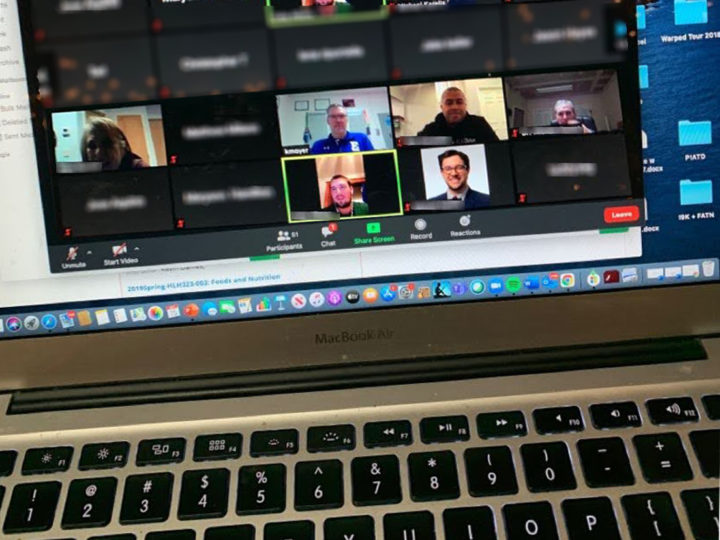By Rebecca Diers – SUNY Cortland
With almost no warning, life for college students last year went from sitting in classrooms with their professors and peers to viewing them on a screen. Now, almost a year later, this is still the case for many students. Last semester at SUNY Cortland, the entire campus was moved to remote learning after the number of positive covid cases on campus rose past one-hundred for multiple weeks in a row. With a new semester having just started this week, 70% of all Cortland classes are still being taught online, with only a handful meeting in-person. For most students, the change to remote learning has been a challenge.
The inability for many students to have classes in-person has put a strain on their ability to learn. For some, this stems from the distractions that come along with online learning. It seems to be a consensus from the students that I interviewed that they are much more focused and that they retain more information when they are learning in a classroom compared to learning remotely.
When asked what her experiences have been with remote learning, Emily, who is in an Athletic Training Program, said, “I have to be in the classroom—anything online I just don’t absorb it as much…. When I’m in online classes, I don’t really feel like I’m there… I don’t participate, I can’t listen, I can’t focus.”
Lindsay, a Physical Education major, felt similarly to Emily: “When I’m in a classroom I am focused on my teacher, but when I’m online looking at my computer I get much more distracted because I am laying in my bed and have my phone next to me.”
Lindsay also said, “When I’m doing work online I think I’m just trying to get things done rather than actually learning.”
After hearing Lindsay’s response, I asked other students whether they felt as though they were actually learning when online, or if they too felt as though they are just completing and submitting work for grades. Kevin, an Outdoor Recreation major, had some interesting points about this.
He said, “I think it’s relatively the same for any online work. Obviously anything done inside a classroom is a lot more live and useful—I think—but that’s just all in how you learn. Some people are hands-on, some people are technical—they need someone to explain it in the moment to them, they also need visual stuff. Online is a tool. When used with physical learning it’s great. When used by itself—for me personally—it is not effective. I don’t think I am learning any less, but the way that I retain knowledge doesn’t line up with remote learning. Through all this remote learning though I have gotten better at learning through online methods.”
In terms of effectiveness, there is not one single way to learn remotely, making it difficult for students to settle into routines and to conform to the many methods their professors use.
In regards to this, Kevin said, “Almost every instructor, teacher, or facilitator has had a different approach to remote learning whether that’s different programs or different teaching styles—there has not been one singular method that has been used between all of my classes so it has been very hard to adapt to each one, and it has been a big hindrance on effective learning throughout my entire last three semesters now.”
Another challenge that comes with remote learning is how it takes away the hands-on experience many college students need for their majors and their future careers.
When asked how she thought remote learning will affect her future, Lindsay, who is hoping to teach Physical Education to Elementary School students, said, “Since I don’t have any in-person classes, I’m not getting any experience or practice teaching. Last year when I was teaching in my classes I got better every time, but now I don’t have the chance to do that.”
Similarly, Rachel, who is a Therapeutic Recreation major hoping to do work in Occupational Therapy, said, “I’m not getting the hands-on experience with people to help me through my career. I also feel that without that experience, it will be harder for me to get a job since I don’t have the knowledge that other people have gotten through their experiences and through just interacting with people.”
Because of the lack of hands-on experience she has received, Emily—who would have already had 450 hours of clinical experience if remote learning never had to be implemented—has been thinking of changing her career path. She said, “I’m already thinking about changing my career because my career—as you know—it’s so hands-on and we’ve had like no clinical practice at all, so basically I want to change to something that I can do online, because it feels like this is never going to end.”
Despite these downsides to remote learning, Kevin pointed out something hopeful about it: “I think learning will become more accessible to people who thought that it wasn’t for them in the first place. So someone who thought that, ‘Oh school isn’t for me,’ maybe it’s more accessible to them now that it’s online. I think that it is going to make [learning] more widespread.”
For now, remote learning is something most students have to learn to adapt to until the world returns back to ‘normal.’ Until then, maybe the challenges that it brings will make us all better connected to one another.
Rebecca Diers is interning with Pressenza as a part of her Professional Writing major at SUNY Cortland. Her other major in Anthropology fuels her passion for understanding different cultures and making connections with people. She uses writing as a way to make sense of the world, and to inspire a sense of humanity in her audience.










